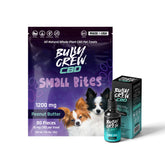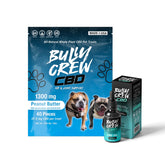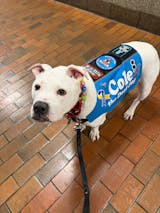Is your dog's tummy trouble more than just a common upset? If frequent, urgent bathroom breaks, loose stools, and even mucus or blood seem to appear whenever life gets a little too hectic for your furry friend, you might be dealing with Stress Colitis in Dogs. This distinct inflammatory condition of the colon is directly tied to the stress and anxiety your dog experiences, making it a particularly challenging ailment for many pet parents.
This blog post will essential guide to exploring the often-hidden causes of stress colitis, detailing the specific signs to watch for, and outlining a comprehensive approach to treating colitis in dogs. From understanding dog colitis medication to exploring supportive therapies like CBD, we aim to help you restore calm and health to your dog's digestive system.
What Causes Stress Colitis in Dogs?
Colitis, in general, refers to inflammation of the colon (the large intestine). When we talk about Stress Colitis in Dogs, the clue is in the name: stress is a primary trigger or exacerbating factor. But what kind of stress are we talking about, and how does it affect a dog's gut?

Dogs, like humans, have a gut-brain axis. It is a bidirectional communication system between the central nervous system and the enteric nervous system (which controls gastrointestinal function). When a dog experiences psychological or physical stress, it can disrupt this balance, leading to physiological changes in the gut.
Common stressors for dogs include:
-
Environmental Changes: Moving to a new home, changes in routine, introducing new pets or people into the household, boarding at a kennel, or experiencing a sudden change in weather patterns.
-
Separation Anxiety: Dogs who become highly anxious when left alone are prone to stress-induced digestive upset.
-
Fear and Phobias: Loud noises (such as thunderstorms or fireworks), visits to the vet or groomer, or interactions with unfamiliar dogs or people can trigger a stress response.
-
Dietary Indiscretion: While not a direct stressor, eating something unsuitable can cause initial gut upset, and the subsequent discomfort and altered routine can then lead to secondary stress and exacerbate colitis.
-
Underlying Health Issues: Sometimes, an existing medical condition that causes pain or discomfort can act as an indirect stressor, contributing to the development of colitis.
-
Over-excitement or Anxiety: Even positive excitement, if overwhelming, can sometimes trigger a stress response in sensitive dogs.
-
Changes in Household Dynamics: The arrival of a baby, a family member leaving, or even tension within the human family can impact a dog's emotional state.
When a dog is stressed, its body releases stress hormones, such as cortisol. These hormones can alter gut motility (how quickly food moves through the intestines), increase gut permeability (making the intestinal lining leakier and more susceptible to inflammation), and change the composition of the gut microbiome. This cascade of events can lead directly to the inflammation characteristic of colitis.
Recognizing the Signs & Symptoms
The symptoms of colitis in dogs are primarily gastrointestinal and can range from mild to severe. If your dog is experiencing dogs with diarrhea and mucus, it's a strong indicator of colitis. The large intestine's primary role is to absorb water and electrolytes and to form feces. When it's inflamed, this function is impaired, leading to characteristic changes in stool.
Key symptoms to look out for include:
-
Diarrhea: This is the most prominent symptom. Unlike small bowel diarrhea, which tends to be voluminous and infrequent, large bowel (colitis) diarrhea is often frequent, small in volume, and urgent. Your dog might strain to defecate (tenesmus) but only produce a small amount.
-
Mucus in Stool: Inflammation of the colon can lead to increased mucus production. This often appears as jelly-like streaks or a coating on the surface of the stool.
-
Blood in Stool (Hematochezia): Fresh, bright red blood often accompanies colitis. This indicates bleeding in the lower digestive tract.
-
Straining/Tenesmus: Your dog may repeatedly squat and strain as if trying to defecate, even when their bowels are empty. This is a painful and uncomfortable sensation.
-
Increased Frequency of Defecation: Dogs with colitis often require more frequent trips outside, sometimes waking you up during the night.
-
Vomiting: While more common with small bowel issues, some dogs with severe colitis may also experience vomiting.
-
Abdominal Discomfort: Your dog might show signs of abdominal pain, such as restlessness, reluctance to be touched, or a hunched posture.
-
Loss of Appetite: In severe cases or with prolonged discomfort, dogs may eat less or refuse food.
-
Weight Loss: This is typically not a primary sign of acute colitis but can occur with chronic or severe, unmanaged inflammation.
How to Treat Colitis in Dogs: A Multi-faceted Approach
Treatment for Stress Colitis in Dogs requires a holistic approach that addresses both the inflammation in the gut and the underlying stress triggers. A proper diagnosis from your veterinarian is the first step, as similar symptoms can be caused by other conditions like parasitic infections, bacterial overgrowth, or even tumors.
Your vet will likely conduct a physical exam, fecal tests (to rule out parasites), and possibly blood tests or imaging. In some chronic or recurrent cases, a colonoscopy with biopsies may be recommended to get a definitive diagnosis and rule out more serious conditions like inflammatory bowel disease (IBD), not primarily stress-induced.
Related: How CBD Supports IBD Treatment in Dogs
Once diagnosed, treating colitis in dogs typically involves a combination of dietary management, medication, and stress reduction strategies.
1. Dietary Management: The Foundation of Dog Colitis Cure
Diet plays a pivotal role in managing colitis.
-
Bland Diet: For acute flare-ups, a temporary bland diet (e.g., boiled chicken breast or lean ground turkey with plain white rice or cooked sweet potato) is often recommended. This gives the inflamed colon a chance to rest and heal.
-
High-Fiber Diet: For many dogs, a diet rich in soluble and insoluble fiber is helpful for the condition. Fiber helps normalize colon function, absorbs excess water, and provides bulk to stool. Your vet might recommend a specific diet designed for gastrointestinal health, or you can discuss adding fiber sources like psyllium husk or canned pumpkin to their regular food.
-
Novel Protein/Hypoallergenic Diets: If food sensitivities are suspected to contribute to inflammation, a novel protein diet (e.g., duck, venison, rabbit) or a hydrolyzed protein diet may be prescribed.
-
Probiotics: Supplementing with a high-quality canine-specific probiotic can help restore a healthy balance of gut bacteria, which is often disrupted during colitis flare-ups.
2. Dog Colitis Medication: Alleviating Symptoms and Inflammation
Depending on the severity and underlying cause, your vet may prescribe dog colitis medication:
-
Anti-inflammatory Drugs: Corticosteroids (e.g., prednisone) are potent anti-inflammatory medications that can quickly reduce colon inflammation. They are often used for acute flares but are typically tapered to the lowest effective dose due to potential side effects with long-term use.
-
Antibiotics: If bacterial overgrowth or a specific bacterial infection is suspected (e.g., Clostridium difficile), antibiotics like metronidazole or tylosin may be prescribed. Metronidazole also has anti-inflammatory properties in the gut.
-
Anti-diarrheal Medications: In some cases, medications to slow gut motility (e.g., loperamide) might be used short-term, but only under veterinary guidance, as they can sometimes mask underlying issues or worsen certain infections.
-
Immunosuppressants: For chronic or severe cases of IBD where stress is a significant factor, but not the sole cause, more potent immunosuppressants might be considered.
3. Stress Reduction and Environmental Modification: A Key Component
Since stress is a primary trigger for Stress Colitis in Dogs, managing and reducing stress is paramount for long-term control and a true dog colitis cure.
-
Identify and Minimize Stressors: Work to identify what triggers your dog's stress. Can you avoid loud noises, provide a safe den during storms, or manage interactions with other dogs?
-
Consistent Routine: Dogs thrive on routine. Maintain consistent feeding times, walks, and playtime schedules.
-
Safe Space: Ensure your dog has a quiet, comfortable safe space in your home where they can retreat when feeling anxious or overwhelmed.
-
Exercise and Mental Stimulation: Engaging in adequate physical exercise and mental stimulation (e.g., puzzle toys, training, scent work) can help alleviate anxiety and pent-up energy.
-
Behavioral Training/Modification: For dogs with separation anxiety or specific fears, working with a certified professional dog trainer or veterinary behaviorist can be invaluable.
-
Anxiety-Reducing Aids: Pheromone diffusers, calming vests (such as ThunderShirt), or calming supplements (e.g., L-theanine, Zylkene) may be beneficial for some dogs.
Can CBD Help with Stress Colitis in Dogs?
The use of cannabidiol (CBD) in veterinary medicine is an area of growing interest, particularly for conditions involving inflammation, pain, and anxiety. While research specifically on CBD for Stress Colitis in Dogs is still in its early stages and more clinical trials are needed, the existing scientific understanding of CBD's mechanisms suggests it may offer supportive benefits.
Here's how CBD might potentially help:
-
Anti-inflammatory Properties: CBD interacts with the endocannabinoid system (ECS), which plays a role in regulating various physiological processes, including immune response and inflammation. By modulating the ECS, CBD may help reduce the inflammation in the colon associated with colitis.
-
Anxiolytic Effects: One of the most well-documented benefits of CBD is its potential to reduce anxiety and promote relaxation. Given that stress is a direct trigger for stress colitis, alleviating anxiety could significantly reduce the frequency and severity of flare-ups. This could be particularly useful for dogs with generalized anxiety, separation anxiety, or specific phobias.
-
Pain Management: CBD is also known for its analgesic properties. If your dog is experiencing abdominal discomfort or pain from colitis, CBD might help provide relief, improving their overall comfort and well-being.
-
Gut Motility and Permeability: Some preliminary research suggests that the ECS plays a role in regulating gut motility and permeability. By influencing these pathways, CBD might indirectly support healthier gut function.
Important Considerations for CBD Use:
-
Consult Your Veterinarian: Always consult your veterinarian before starting any CBD regimen for your dog, especially if they are already on dog colitis medication. CBD can interact with other drugs, and your vet can advise on appropriate dosing and monitor for potential side effects.
-
Source Quality: Choose a high-quality, third-party tested CBD product specifically formulated for pets. Look for certificates of analysis (COAs) to ensure purity, potency, and the absence of contaminants like pesticides and heavy metals.
-
Dosage: Dosing CBD for dogs can be complex and depends on factors like weight, individual sensitivity, and the severity of the condition. Your vet can help determine a safe and effective starting dose.
While CBD is not a standalone dog colitis cure, its potential to reduce inflammation and anxiety makes it an intriguing supportive therapy for dogs struggling with stress colitis. It could be a valuable addition to a comprehensive treatment plan, particularly for managing the stress component of the condition.
Conclusion
Stress Colitis in Dogs is a challenging condition for both pets and their owners, but with a thorough understanding and a multi-faceted approach, it is highly manageable. Recognizing the signs is the first critical step toward getting your dog the help they need.
The journey to a happier, healthier gut involves a combination of targeted dietary changes, appropriate dog colitis medication as prescribed by your vet, and a dedicated effort to minimize stress in your dog's life. While there isn't a single dog colitis cure that works for every case, a combination of these strategies often leads to significant improvement and long-term control. Emerging therapies like CBD offer promising avenues for additional support, particularly in addressing inflammation and anxiety.
By working closely with your veterinarian and remaining vigilant about your dog's health and environment, you can effectively manage stress colitis, helping your beloved canine companion live a comfortable, happy, and stress-free life.
More from Craig:







